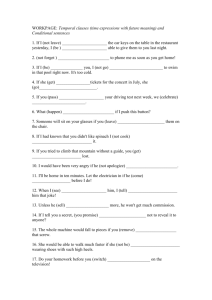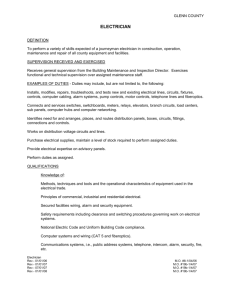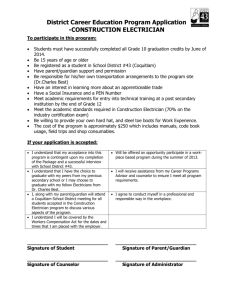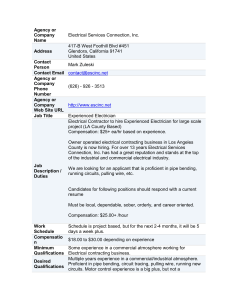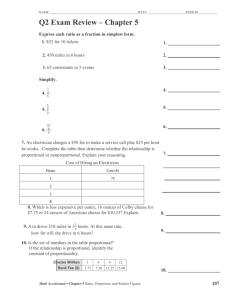state of iowa electrical faq's examination and licensing questions
advertisement
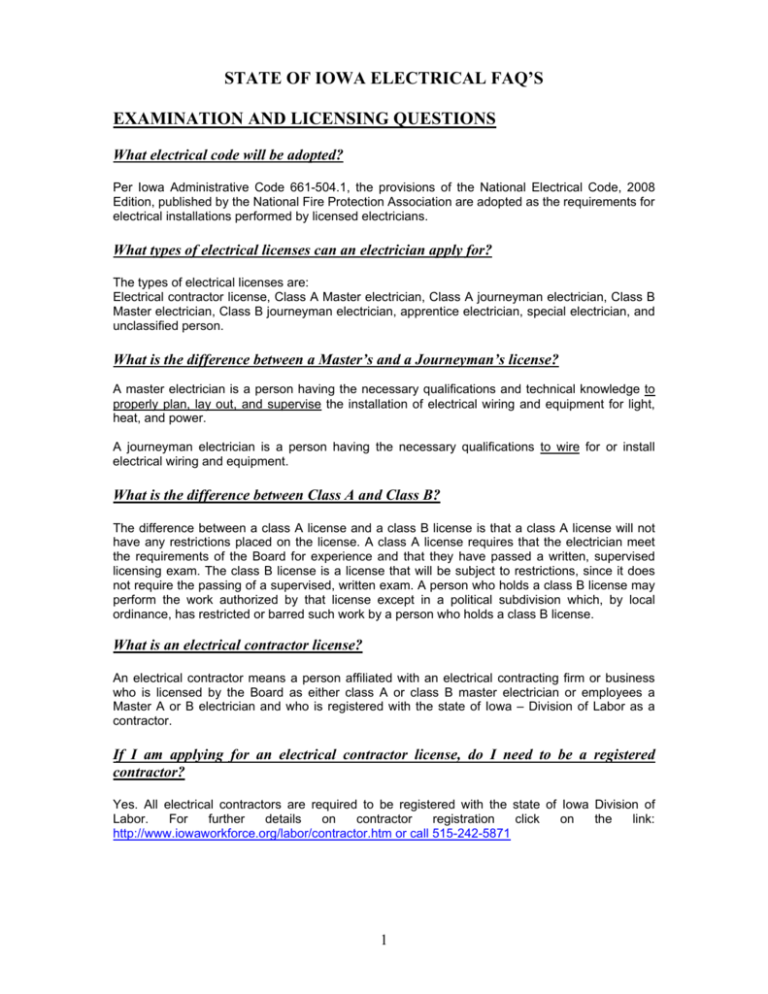
STATE OF IOWA ELECTRICAL FAQ’S EXAMINATION AND LICENSING QUESTIONS What electrical code will be adopted? Per Iowa Administrative Code 661-504.1, the provisions of the National Electrical Code, 2008 Edition, published by the National Fire Protection Association are adopted as the requirements for electrical installations performed by licensed electricians. What types of electrical licenses can an electrician apply for? The types of electrical licenses are: Electrical contractor license, Class A Master electrician, Class A journeyman electrician, Class B Master electrician, Class B journeyman electrician, apprentice electrician, special electrician, and unclassified person. What is the difference between a Master’s and a Journeyman’s license? A master electrician is a person having the necessary qualifications and technical knowledge to properly plan, lay out, and supervise the installation of electrical wiring and equipment for light, heat, and power. A journeyman electrician is a person having the necessary qualifications to wire for or install electrical wiring and equipment. What is the difference between Class A and Class B? The difference between a class A license and a class B license is that a class A license will not have any restrictions placed on the license. A class A license requires that the electrician meet the requirements of the Board for experience and that they have passed a written, supervised licensing exam. The class B license is a license that will be subject to restrictions, since it does not require the passing of a supervised, written exam. A person who holds a class B license may perform the work authorized by that license except in a political subdivision which, by local ordinance, has restricted or barred such work by a person who holds a class B license. What is an electrical contractor license? An electrical contractor means a person affiliated with an electrical contracting firm or business who is licensed by the Board as either class A or class B master electrician or employees a Master A or B electrician and who is registered with the state of Iowa – Division of Labor as a contractor. If I am applying for an electrical contractor license, do I need to be a registered contractor? Yes. All electrical contractors are required to be registered with the state of Iowa Division of Labor. For further details on contractor registration click on the link: http://www.iowaworkforce.org/labor/contractor.htm or call 515-242-5871 1 I have a license from another state, will this license be accepted in Iowa? Reciprocity with other states will be determined by the Examining Board. The Board may grant licenses, without examination, of the same grade and class to an electrician who has been licensed with another state for at least one year. The applicant must furnish proof that the qualifications they possess are equal to the qualifications of holders of similar licenses in the state of Iowa. Reciprocity agreements have not yet been established, but will be a priority of the Board once the administrative rules are completed. Is there a “grandfathering clause”? Contained in Iowa Code sections 103.10 subsection 3 and 103.11 subsection 3 there are provisions for electricians that are not licensed by a local jurisdiction, but have been working as an electrician. The language of the law states that an applicant who can provide proof acceptable to the Board that the applicant has been working in the electrical business and involved in planning for, laying out, supervising, and installing electrical wiring or equipment prior to 1998 may be granted a class B master electrician. An individual who can prove to the Board that they have been acting as a journeyman electrician since 1998 will be granted a Class B journeyman’s license. The Board will adopt rules establishing procedures relating to the restriction of a class B license. Some local jurisdictions may restrict the work of Class B electricians and require class A electricians. A class B master or journeyman electrician may become licensed as a class A master or journeyman electrician upon successful passage of the examination approved by the Board. What is a special electrician license? A special electrician is a person that has the necessary qualifications, training, and experience in wiring of special classes of wiring, equipment or other installations. The special electrician license includes four endorsements. Each special electrician shall carry one or more endorsements. The endorsements are as follows: Endorsement 1, “Irrigation System Wiring,” shall be included on a special electrician license if the licensee requests it and has passed a supervised examination approved by the board or has completed two years, or 4,000 hours, of documented experience in the wiring of irrigation systems. IAC 1/16/08 Endorsement 2, “Disconnecting and Reconnecting Existing Air Conditioning and Refrigeration Systems,” shall be included on a special electrician license if the licensee requests it and has passed a supervised examination approved by the board or has completed two years of documented experience in the disconnecting and reconnecting of existing air conditioning and refrigeration systems. Endorsement 3, “Sign Installation,” shall be included on a special electrician license if the licensee requests that it be included. This endorsement does not authorize a licensee to connect power to a sign that has a voltage greater than 220V and an ampere rating greater than 20 amps. Initial installation or upgrading of the branch circuits supplying power to the sign shall be completed by a licensed master electrician or by a licensed journeyman electrician under the supervision of a master electrician. Endorsement 4, “Residential Electrician,” shall be included on a special electrician license if the licensee requests it and has passed a supervised written examination approved by the board or has completed four years of documented experience performing residential electrical work. A political subdivision may, by enactment of an ordinance filed with the board prior to its effective date, require that a special electrician performing work authorized by this endorsement be supervised by a master electrician. 2 What exam will be used for the licensing examinations? At its September 25, 2007 meeting, the Board adopted a resolution stating that they intend to accept licenses which had been issued by a local jurisdiction based upon a score of 75 or above on a supervised examination offered by Prometric or Thompson Prometric or its predecessors. (This examination was previously offered by Experior Assessment and by Block.) Persons who apply for a state license based upon holding a local license which meets criteria established by the Board will also be required to meet other criteria, such as years of experience and payment of licensing fees. This action of the Board relates only to the test currently offered by Prometric or Thompson Prometric. The board has begun accepeting city examinations. For a complete listing of cities and license types visit: http://www.dps.state.ia.us/fm/electrician/cityexams.shtml Which version of the National Electric Code (NEC) is prometric testing currently on? Prometric will test on the 2005 NEC until April 1, 2009. After April 1, 2009, Prometric will begin testing on the 2008 NEC. How would I go about getting state sponsorship to take the Prometric examination for Journeyman or Master A? State Sponsorship requirements include completion of application and submission of sponsorship forms to the State Electrical Examining Board. The forms can be found online at http://www.dps.state.ia.us/fm/electrician/PDFs/Testing_Sponsorship_InstructionSheet.pdf (Instructions) and http://www.dps.state.ia.us/fm/electrician/PDFs/testing_sponsorship_form.pdf (form) I am already licensed as a journeyman/ master electrician in a local jurisdiction where I had to take a test to get licensed, what do I need to do to get a state license? A person licensed by a local jurisdiction before January 1, 2008 who passed a supervised, written Thompson Prometric exam or its predecessors and is currently working in the electrical contracting industry, shall be issued an applicable statewide license corresponding to that licensure. The Examining Board will adopt criteria for city examination standards to ensure that the exams meet or exceed the statewide testing criteria approved by the Board. I have worked as an electrician for many years in an unlicensed area of the state, what do I need to do to get a state license? Contained in Iowa Code sections 103.10 #3 and 103.11 #3 there are provisions for electricians that are not licensed by a local jurisdiction, but have been working as an electrician. The language of the law states that an applicant who can provide proof acceptable to the Board that the applicant has been working in the electrical business and involved in planning for, laying out, supervising, and installing electrical wiring or equipment prior to 1990 may be granted a class B master electrician. An individual who can prove to the Board that they have been acting as a journeyman electrician since 1990 will be granted a Class B journeyman’s license. Some local jurisdictions may restrict the work of Class B electricians and require class A electricians. A class B master or journeyman electrician may become licensed as a class A master or journeyman electrician upon successful passage of the examination approved by the Board. I only wire houses and perform only residential work. Is there a license for just residential wiring? Yes. A special electrician with a Residential Electrician endorsement can perform electrical work in a residence in which there are no more than four living units within the same building. The 3 residential electrician endorsement requires that the licensee pass a supervised written examination approved by the Board or has completed four years of documented experience performing residential electrical work. A political subdivision may, by enactment of an ordinance filed with the board prior to its effective date, require that a special electrician performing work authorized by this endorsement be supervised by a master electrician. I am a homeowner. Will I have to be licensed to wire my own house? A license is not required for an owner of property performing work on the owner’s principal residence, if such residence is an existing dwelling rather than new construction and is not larger than a single-family dwelling, or farm property. New construction of a dwelling would require the electrical work to be performed by a licensed electrician. An inspection would be required for all new electrical installation regardless of whether a license is required. Do I need to be a licensed electrician to work for an electrical utility company? No. Employees of municipal corporations, electric cooperatives, public utility corporations, rural water associations or districts, railroads, telecommunications companies, franchised cable television operators, or commercial or industrial companies performing manufacturing, installation, and repair work do not require an electrical license as long as the employee is acting within the scope of their employment. I work as a maintenance engineer for a school district or hospital. Do I need to become a licensed electrician to be able to continue working on electrical repairs for the school or hospital? The Electrical Examining Board has defined Routine Maintenance as the repair or replacement of existing electrical apparatus or equipment of the same size and type for which no changes in wiring are made. The performance of routine maintenance in itself does not require a person to obtain or hold a license as an electrician or electrical contractor. I work as an electrician for a commercial or industrial facility. Do I need to become a licensed electrician to be able to continue working on electrical work for the facility? No. According to Section 103.22 of Iowa Code 103 does not require a license for employees of commercial or industrial companies performing manufacturing, installation, and repair work for such an employer while acting within the scope of their employment. Will a surety bond and public liability insurance policy be required to obtain an Electrical Contractor license? No. A surety bond is not required by the state of Iowa at this time, however a local jurisdiction can require a suerty bond in their jurisdiction. Yes. Public liability insurance will be required by the licensing law. Per Iowa Administrative Code 661 –Ch. 502.6, any holder of an electrical contractor license or any holder of an electrician license who is not employed by a contractor and who contracts to provide electrical work shall maintain insurance coverage. The licensee shall maintain general and complete liability insurance in the amount of at least $1 million dollars for all work performed. The Board shall be notified by the insurer if the coverage is not maintained. INSPECTION QUESTIONS 4 When will I need to have my work inspected? State Electrical inspections will not begin until March 1, 2009. If you work in an area where local inspections are currently required, you are still required to have your electrical work inspected by that local jurisdiction. I have heard that the State of Iowa will be hiring electrical inspectors. How will I know when the inspector jobs are available and how can I apply? The State of Iowa will have a need for electrical inspectors. When positions become available, they can be viewed at the Iowa Department of Administrative Services Human Resources Enterprise website. The website can be accessed by the following link: http://das.hre.iowa.gov/state_jobs.html Keyword Search for “Public Safety” LICENSING QUESTIONS CONCERNING MUNICIPALITIES Does a city still need to issue electrical licenses after January 1, 2008? A city can decide whether it wants to continue to offer licenses after the first of the year. Can a city still issue local licenses? A city will still be able to issue electrician licenses for their jurisdiction only. The license will only be valid in that jurisdiction and can not be used to obtain a license or act as a license in another jurisdiction (Example: A Des Moines license would no longer be valid to be used to obtain or act as a license in another metro suburb) What electrical code will be adopted? Per Iowa Administrative Code 661-504.1, the provisions of the National Electrical Code, 2008 Edition, published by the National Fire Protection Association are adopted as the requirements for electrical installations performed by licensed electricians. Do cities have to adopt the state electrical code? The code that the Board adopts will apply to all electrical installations across the state. The codes that cities enforce cannot be less restrictive than the state electrical code. Will a city have the authority to make amendments to the state electrical code? Yes, but the code that cities enforce cannot be less restrictive than the code that is enforced by the state. Will city inspectors be required to be certified by the state electrical board? Yes, On and after January 1, 2009, a person appointed to act as an electrical inspector for the state shall obtain an inspector's certificate of qualification within one year of such appointment and shall maintain the certificate thereafter for the duration of the inspector's service as an electrical inspector. On and after January 1, 2014, a person appointed to act as an electrical inspector for a political subdivision shall obtain an inspector's certificate of qualification within one year of such appointment and shall maintain the certificate thereafter for the duration of the inspector's service as an electrical inspector. 5 6
